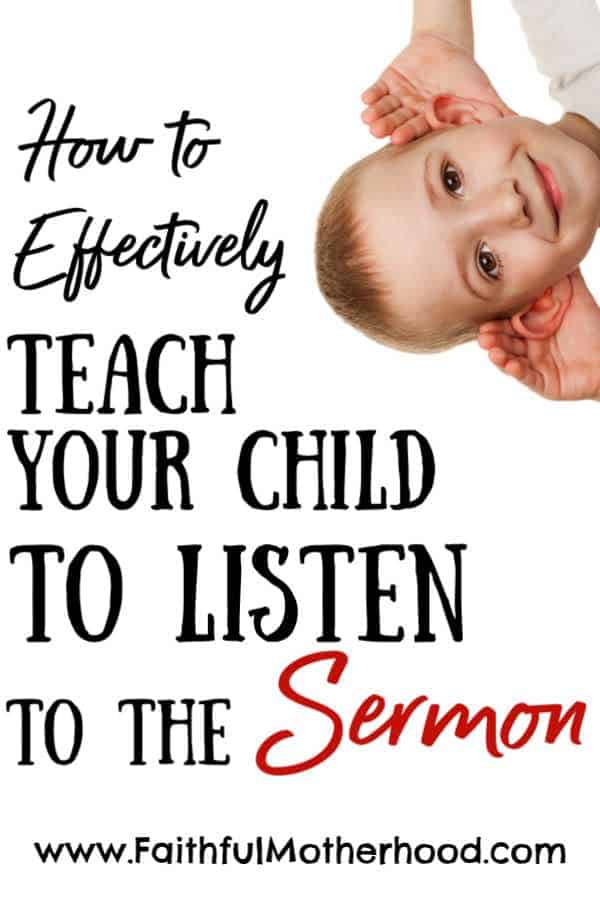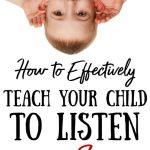We want our child to listen to the sermon yet how do we teach them to do that? When we gather together weekly as a church for worship, it is a special time to be together as the family of God.
We spend time singing our praises to God, praying, and spending time dwelling on God’s word together.

The pastor at your church has, ideally and hopefully, spent countless hours prayerfully researching and preparing the message that God has first of all laid on their heart for the congregation to hear.
For a precious 15-30 minutes, more or less depending on your church, they seek to deliver that message in a way that sticks, is remembered, and – consequently – makes a difference
The Sermon Listening Dare
I dare you to gather a group of people who were in church together on Monday for lunch and ask them questions about the sermon. How well did they listen to the sermon?
Some might remember a funny story or joke from the sermon. Ideally, someone will remember the core message but they might need a bulletin for a memory jump start.
At the moment, we likely heard a true word from the Lord that as a result had an application in our lives. An argument made spoke to our hearts in a new way. It wasn’t necessarily Pentecost, but we had a light bulb moment.
Unfortunately, it started to fade as the afternoon wore on and vanished at sunset. I know it has happened to me before. It is hard to listen to the sermon and to remember.
Students Take Notes to Learn
Remember being in class as a student? Remember taking notes because what the professor or teacher was talking about was important? You had to write it down so that you could remember the information and try to learn it for the exams.
We knew that this teaching was specific to what we needed to know (at least for the exam) and there would be a consequence if we did not pay attention. When we take notes, we are helping to teach our child to listen to the sermon.
Pull your toes back, if you already picked up on where I am going.
Do we approach the sermon like we are in school preparing for an exam or more like sitting down as a family to watch a show on television?
Do we listen to the sermon in order to entertain us for a short while and leave us feeling good? Is your child to listen to the sermon like a student or how they would watch a show?
Our entertainment & technology-focused culture has made a dramatic impact on how we receive information and learn. We are so bombarded with messages and images that, consequently, we do not know how to truly listen.
We certainly don’t know how to listen for the length of a sermon. It is hard for a child to listen to the sermon because of these other influences.
Sometimes our children will even say that the sermon is boring. Even adults utter these words. We want our children to be engaged in worship yet the answer isn’t found in shorter or more entertaining sermons.
Listening to the Sermon is a Skill
Hence, the need is for us to learn how to listen to the sermon. Listening to a sermon is a skill. You must teach your child to listen to the sermon. We have to intentionally train our brains to listen, remember, and apply the message that is delivered to us.
We may not have pop-quizzes in worship with the deacons handing out test papers and watching to make sure there is no cheating. Can you imagine the panic? Turn the screws while we give the deacons some microphones. Admit it, you are laughing!
Better Speakers, Better Listeners
If we peel back the curtain and look behind the scenes of the sermon, we realize that at its heart – it is a speech. We don’t do a good job of teaching students the skill of public speaking much anymore.
That’s a shame. Learning to speak also helps us be better listeners. Learning how to listen to the sermon and hear the sermon, can make us better doers of the word.
A sermon should have a core message. Usually, it is related to the sermon title. Then the pastor will expound upon this core message with specific points of support.
Stories or examples are often used to illustrate these points. There is a structure. (At least their ought to be.)
Even if the pastor preaches verse by verse through the Bible this same structure is going to be naturally evident. Why? Pastors are imitating the writers of scripture who display this same general organization.
Ever notice that some Bibles include an outline of the particular book you are reading at the beginning of the book. This helps us understand the themes and major arguments of the book.
Use Sermon Narration to Help Develop Listening Skills
We need to teach ourselves and our children how to actively, deeply listen to sermons. You already have some of these skills if you have ever practiced narration with your children.
A narrator tells you what is going on in the play. We engage our children in narration when we ask them questions about what they are reading and have them tell us what is going on. Narration skills will be very helpful in teaching our child how to listen to the sermon.
Who are the main characters? What is the setting? What are the characters struggling with? Our goal is to have our child tell us the gist of the story in their own words.
This is the same goal that we are striving for with our children with regard to the sermon. We want them to be able to tell us what the sermon was about in their own words AND tell us what they are going to do because of what they have heard.
Prepare your Child to Listen to the Sermon
We need to prepare to listen to the sermon. Help your child to listen to the sermon by going over the bulletin before worship. It is a great way to prepare to listen to what God is going to say. (Great reason to get there early too.)
What is the scripture? Help your child find it in the Bible and read through it. In a sentence or two, have them tell you what the verses or passage is about.
What is the sermon title? Why do you think it has the title?
Look at the music. Does the song title seem to connect to what you anticipate the sermon is going to be about?
Get Your Pencil Out for the Message
Now it is the time in the service for the message. To be a better listener, you need a pencil. In class, as students, we take the message seriously when we write down the information. The act of writing helps us put the information into our brains, in addition to the notes that help us remember later.
What to write? Core Message. Repeated words or phrases. Words that jump out at you. Phrases that resonate with you.
Does your church use screens? The screens reinforce core ideas and messages.
These are the initial steps in attending to the sermon. These are skills. They, therefore, have to be practiced again and again. We are training our ears and our hearts to pay attention, to hear, and to receive.
The more we do this, and the more our children do this, the stronger these skills will become. Being able to produce an outline of the sermon given would reflect mastery of this skill but that is a long way off.
What is the Most Important Goal when Listening to the Sermon?
Plus, in the end, producing an outline of the sermon is not the most important goal. What? I am imploring you to listen more intensively to the sermons and giving you guidance on how to teach your children to actively listen to the sermon and then I am telling you that is not the ultimate point??
“But be doers of the word and not hearers only, deceiving yourselves.” James 1:22
The point of the sermon is not just to give us knowledge but to make us better equipped to apply the gospel to our lives and sharing it with others!

Let’s Talk Application to Help Our Child Listen to the Sermon
When are we going to ask our children and ourselves this important question of application? It begins in the car and continues into lunch.
Talking about the sermon helps us to wrestle with those ideas longer. It holds it in our imaginations longer, giving us more time to process and remember.
This gospel conversation, therefore, gives us the opportunity as a family to seek out how God wants us to live differently and provides built-in accountability. As a result, the discipleship of our children is ultimately the continued discipleship of ourselves.
The discipleship of our children is ultimately the continued discipleship of ourselves.
Sometimes the sermon is not as organized as well as it should or delivered in the best way. We are easily distracted and instead of seeking to learn, our hearts are oriented toward grading. Instead of being the student, we assume the role of the one who is grading.
Pastors are human. Not every sermon is perfect. Some weeks the pastor has less time to prepare because of other emergencies or needs going on in the congregation. Some pastors are more gifted in areas other than preaching.
Our focus should always be on the message, not the messenger. You can always go straight to the text, the Bible, for a direct sermon from its pages.
Are you a good listener and doer? How do you actively listen to sermons? Do you have any tips to share in helping your children listen to the sermon?
Related Posts:
6 Practical Tips to Help Your Child Sit Still in Church
How to Easily Get Kids Dressed for Church
7 Tips to Overcome Complaining and Get Your Kids to Church

The voice behind FaithfulMotherhood.com is Jyn. She is a veteran homeschool mom of three. More than just a pastor’s wife, she holds a Master of Divinity degree and has served in church leadership for over 20 years. Her passion is equipping parents to live out their calling as the number one faith influencer for their children. She longs to see moms empowered by God’s Word and transferring that love to their children through daily Bible study and family devotions.







